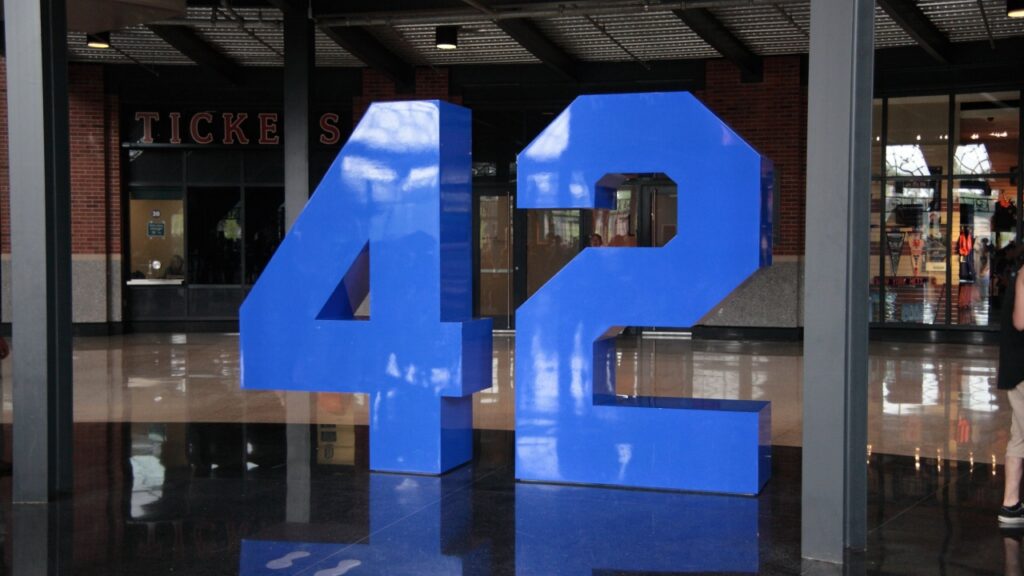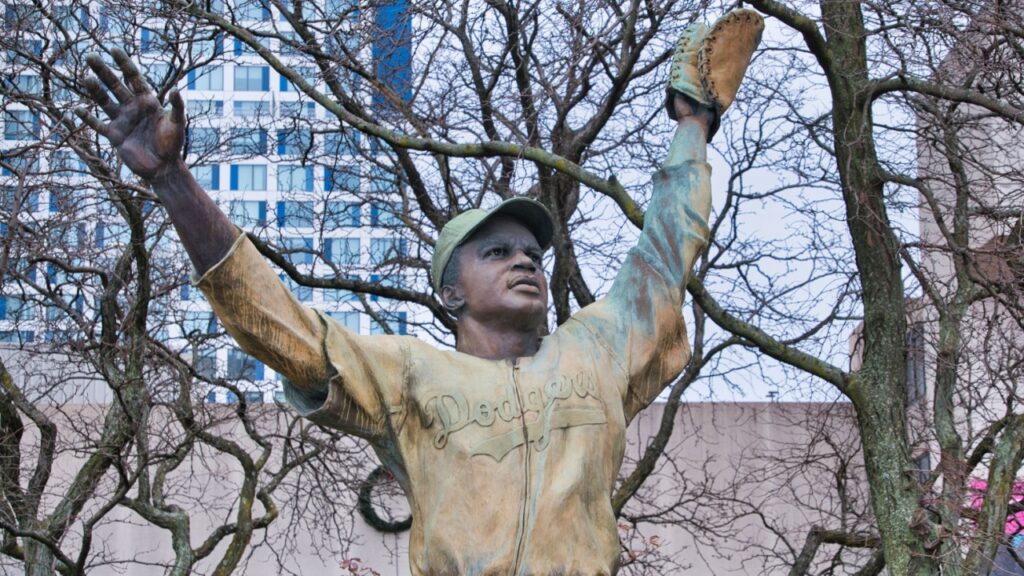
Jackie Robinson is remembered as one of the most important figures in American history. He broke the color barrier in Major League Baseball and changed the world of sports forever.
Before Robinson, professional baseball was segregated. Black players were forced to play in the Negro Leagues and were denied the chance to compete on the biggest stage.
When Robinson stepped onto the field for the Brooklyn Dodgers in 1947, everything changed. His courage and talent opened doors for generations of athletes to come.
His story wasn’t only about baseball. It was also about courage, sacrifice, and paving the way for racial equality in America.
Breaking the Color Barrier
Jackie Robinson debuted for the Brooklyn Dodgers on April 15, 1947. This made him the first African American to play in Major League Baseball in the modern era.
The decision to sign him was made by Dodgers executive Branch Rickey. Rickey believed it was time to end segregation in baseball, and he saw Robinson as the perfect man for the challenge.

Rickey admired Robinson’s ability to stay calm under pressure. He told Jackie he would need “the guts not to fight back” when faced with hate and violence.
Robinson faced intense racism from fans, players, and even some teammates. He was insulted, threatened, and targeted on the field with aggressive play.
Some opposing teams even threatened to strike if he played. Stadiums echoed with racial slurs, and pitchers aimed fastballs at his head.
Through it all, he stayed strong. Rickey asked Robinson to have the courage not to fight back, and Jackie proved his strength through discipline and dignity.
Robinson didn’t just represent himself; he carried the hopes of millions of African Americans. His success showed the country that integration in baseball was possible.
His debut was more than just a personal achievement. It was a turning point in both sports and American society.
Jackie’s Impact on the Field
Robinson wasn’t only important because he broke barriers. He was also an incredible baseball player who proved he belonged at the highest level.
He won the Rookie of the Year award in 1947. In 1949, he was named National League MVP after batting .342 and stealing 37 bases.
Over his 10-year career, he was a six-time All-Star. He helped lead the Dodgers to six pennants and a World Series title in 1955.
Robinson’s style of play was exciting and aggressive. He brought speed and daring that changed the way baseball was played.

He stole home plate 19 times in his career, more than any player in modern history. Fans loved his energy, and opponents feared his relentless competitiveness.
Robinson wasn’t afraid to challenge baseball’s unwritten rules. His fiery play earned him both respect and resentment, but it always kept him at the center of attention.
He also raised the level of play for his teammates. With him in the lineup, the Dodgers became one of the most feared teams in the league.
His performance showed that talent has no color. By excelling, he silenced critics who doubted that Black players could compete in the majors.
Challenges Off the Field
Robinson’s struggles didn’t stop when he left the stadium. He and his family faced threats, hate mail, and discrimination everywhere they went.
Hotels, restaurants, and neighborhoods often refused to serve or house him. Even when traveling with the Dodgers, he was treated differently from his teammates.
Robinson received numerous death threats. Some letters warned that he would be killed if he played certain games. Despite this, Robinson never gave up. He knew his actions would make life better for others who followed.
His wife, Rachel Robinson, stood by his side and gave him strength. She became an important figure in his journey, offering support during the darkest moments.
His courage inspired millions of African Americans. He became a symbol of hope during a time when segregation and inequality were everywhere.
Jackie also used his platform to speak out. He wrote letters, gave speeches, and fought for civil rights long after his playing days were over.
Even when baseball ended, the fight for justice continued for Robinson. He carried his determination into business and social activism.
Influence on Civil Rights
Jackie Robinson’s success gave momentum to the Civil Rights Movement. He showed the country that integration was possible, even in areas filled with tradition and resistance.
He worked closely with leaders like Dr. Martin Luther King Jr. King once said that Jackie was a pioneer who “made my success possible.”
Robinson became the first Black person to serve as vice president of a major American company when he joined Chock full o’Nuts. This showed his impact went beyond sports.
He also helped raise money for organizations fighting segregation. His speeches and public stance inspired others to demand equality.
In 1963, he joined the March on Washington, standing alongside civil rights leaders. His presence connected sports with the larger struggle for freedom.
By breaking barriers in sports, he broke barriers in society. His actions influenced schools, businesses, and other institutions to move toward integration.
Robinson also supported political candidates who pushed for civil rights. He used his fame to encourage voter participation and fight against injustice.
Even after his death in 1972, Robinson’s name remained tied to the fight for equality. His story is still a symbol of courage and justice.
Legacy in American Sports
Jackie Robinson’s number 42 is retired across all of Major League Baseball. No player on any team can wear it, except on Jackie Robinson Day each April 15.
On that day, every player, coach, and umpire wears the number 42. It is a tribute to the man who changed baseball and America.
His story has been told in books, movies, and documentaries. The film 42 introduced a new generation to his courage and determination.
Robinson’s impact can be seen in every major American sport. Athletes of all backgrounds credit him for opening the doors they now walk through.
Leagues like the NBA and NFL followed baseball’s example of integration. Robinson’s success made it impossible for other sports to ignore the demand for change.
Today, when athletes speak out for justice, they follow in Robinson’s footsteps. His example showed them that sports and social change can go hand in hand.
Modern stars like LeBron James, Serena Williams, and Colin Kaepernick have cited Robinson’s courage as inspiration. His story gives athletes the confidence to use their voices.
Robinson’s influence stretches beyond the field and court. He proved that one person could change both a sport and a nation.

Frequently Asked Questions
Q: When did Jackie Robinson break the color barrier?
He debuted for the Brooklyn Dodgers on April 15, 1947, becoming the first Black player in modern Major League Baseball.
Q: What awards did Jackie Robinson win?
He was Rookie of the Year in 1947, MVP in 1949, and a six-time All-Star, and he helped the Dodgers win the 1955 World Series.
Q: Did Jackie Robinson face racism from teammates?
Yes, some teammates opposed his presence at first, but over time, many grew to respect him for his courage and talent.
Q: What was Jackie Robinson’s role in the Civil Rights Movement?
He worked with leaders like Martin Luther King Jr., gave speeches, and used his fame to push for equality and integration.
Q: Why is Jackie Robinson Day important?
Every April 15, MLB honors Robinson’s debut by having all players wear number 42. It reminds fans of his lasting impact.
Conclusion
- Jackie Robinson was more than a baseball player—he was a trailblazer who broke barriers.
- His courage on and off the field inspired millions.
- He showed that sports can be a powerful tool for justice and equality.
- Robinson’s impact is still felt today whenever athletes speak up for what is right.
- His story is one of bravery, perseverance, and change.
- He remains a legend not just in sports, but in American history.
This article was made with AI assistance and human editing.



